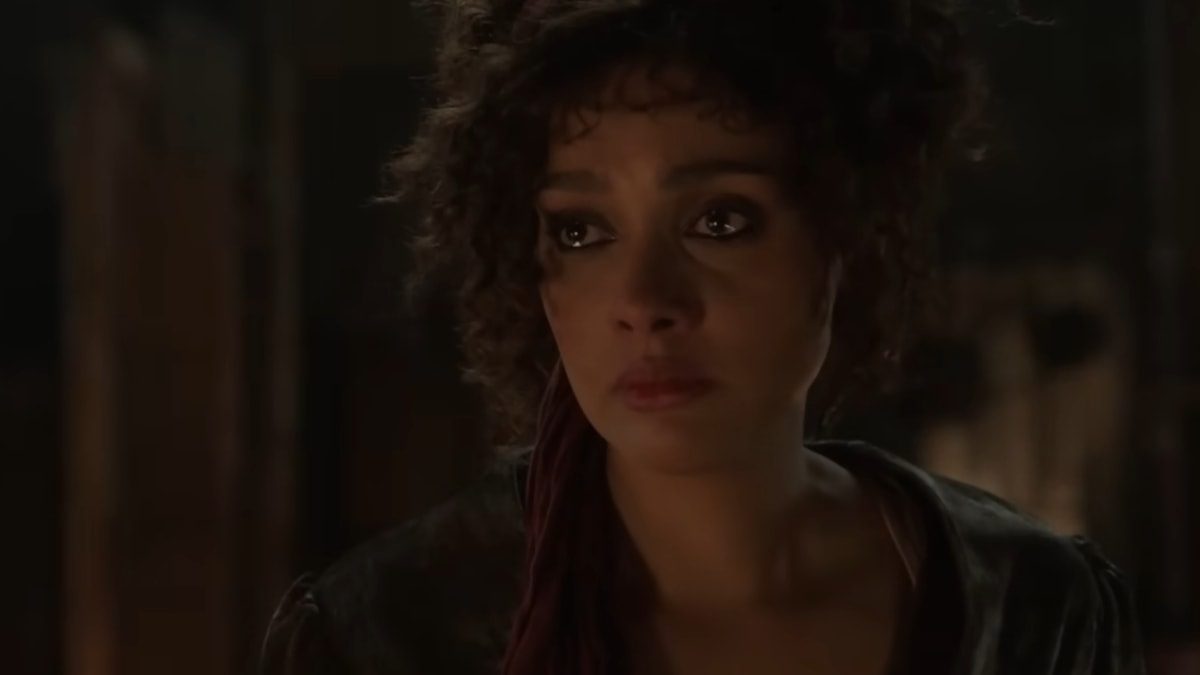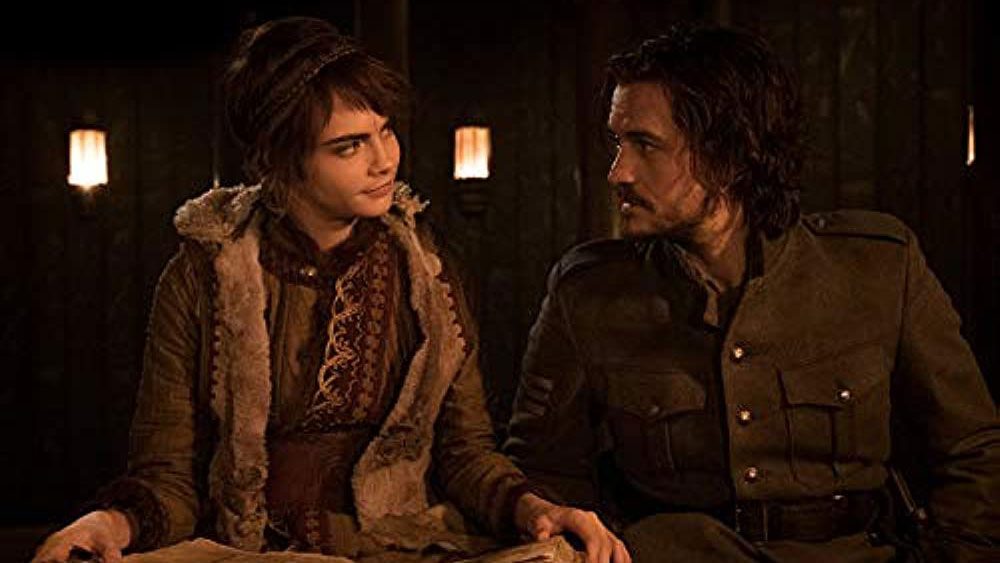REVIEW: Carnival Row – Season 2, Episodes 3 and 4, “The Martyr’s Hand” and “An Unkindness of Raven”
"You can't fix this by following the rules. Rules weren't made for us."
***SPOILERS***
“The Martyr’s Hand” opens on Tourmaline as he learns Dahlia’s fate. The police arrive at the scene and merely mock the victims, insinuating they deserved it. Millworthy asks Philo to hold off on his plan while he enacts one of his own, seeing weakness in the Chancellor after the previous day’s events. Sophie visits the sick pixies, seeing firsthand the suffering of the Row’s most vulnerable. Tourmaline describes one of her visions to Philo, and he realizes it’s the death the police are investigating. The owner of the fighting house kicks Darius out because of the Raven’s activities. The Pact’s leadership questions Millworthy’s intentions, given that he advocates for the rights of the Fae folk. Sophie motions to reopen the Row to get industry moving in the Burg, and the Chancellor greenlights the decision. Ezra is visited by family friends who share a rumor that Imogen eloped with Agreus willingly. Meanwhile, Tourmaline leads Philo to the site of her vision. They find the bodies of Dahlia and her follower, suggesting they were killed by the same person as the officer. Vignette rallies the Raven to stand up to the Burg. Ezra finds Fergus, Agreus’ servant, and learns what happened to him and Imogen. He kills Fergus. Philo brings the news of the murders to the Raven, pleading with them not to start a war with the cops. Vignette presents him with a choice: stand with the Raven or the police.

“An Unkindness of Raven” opens with Agreus and Imogen learning the harsh truth of the New Dawn, having to work and make their way with these strangers. Agreus discovers that four people were using the room he and Imogen now inhabit. A woman named Hanna has been separated from her family and must sleep in the hall as a result of their arrival. Imogen is called to speak with Leonora again and comes to like and respect her. Agreus finds that Hanna has disappeared. Ezra arrives in the Pact and warns Leonora about the sale of weapons to the Pact. At home, Sgt. Dumbey chats with his family until Philo and Darius arrive to warn him about the impending Raven attack. The Ravens do arrive, and Una’s husband tries to kill Dumbey for slaying his wife. Philo intervenes, to Vignette’s frustration, and saves Dumbey. Tourmaline fetches a spell to reverse her curse. Sgt. Dumbey spares Philo a prison sentence, sending him back to the Row. When Dumbey and the police come out looking for the Ravens, Vignette turns herself in to them.

I must question the world-building yet again. Tourmaline can see ghosts, and tapping into her involuntary abilities is considered dark magic? Why is that the case when the woman helping her is also a seer? Why is it okay to have these powers sometimes, but other times, it makes you a monster? Aside from the Fae/human division, the rules and customs of this world are unclear and confusing. I think that’s the biggest problem with Carnival Row, setting aside the characters. They’re not horribly conceived, and I like the cast, but I don’t care about them. They’re not written to be terribly realistic or understandable, with a couple of exceptions. I’m okay with a world being unrealistic, but the characters need to be believable and have human strengths and weaknesses.

I will give “An Unkindness of Raven” points for the “strengths and weaknesses;” this is the first humanity we’ve seen from Dumbey whatsoever. First, we’re introduced to his family and see a kind side of his personality in their presence. Then, he cuts Philo a break for saving his life. Sure, he still treats him poorly, but he saves his life in return, and that’s all he really can do in the presence of his men. Are they redeeming this irredeemable man? Hating Dombey was one of the few strong emotions I had about season 1. I’m genuinely interested in these developments with this character, which is more than I can say about most of the cast. I like Philo, too, mostly because of Orlando Bloom’s performance and the character’s even-tempered approach to murder and other tragedies. It’s understandable why Vignette feels so strongly, but Philo’s desire to protect the Row and especially her seems more thoughtful.

One character I’m really getting tired of is Jonah Breakspear, the Chancellor. He’s not very smart or good at his job, and I’m tired of him following Sophie like a lost puppy. I get that she’s sleeping with him, and maybe he feels some sort of loyalty to his half-sister. Perhaps he feels she would reveal their relationship, both biological and sexual, if he stopped obeying her. Regardless of his feelings and motivations, I don’t like this character. I don’t even think he makes a good villain because he’s not interesting or intimidating in the slightest. Sophie is less annoying but more perplexing, with her apparent aim being to become the Chancellor herself… to help the fae folk. So now, she’s a genuinely good person doing all this political intrigue to help the underdog – in some cases, literally. By the way, this is another world-building thing, but I struggle with accepting that the pixies would be treated this way. At least fauns are “ugly” by conventional beauty standards, but the pixies are like Tolkien’s elves, long and graceful. The pix women are more beautiful than many of the show’s human women. Leonora’s explanation of her disgust with her husband’s feet and his with her hooves made me laugh, and this seemed like a surprisingly honest, human moment. Getting close to someone so different does require a learning curve.

“The Martyr’s Hand” and “An Unkindness of Raven” present some improvements but overall remain muddled and dull. The politics and world-building of the Burg and the Pact are heavy-handed and poorly explained. I don’t really like Vignette, or most of the characters aside from Philo and perhaps Dombey.
Carnival Row – Season 2, Episodes 3 and 4, "The Martyr's Hand" and "An Unkindness of Raven"
Plot - 6
Acting - 6
Progression - 6
Production Design - 6
Character Development - 6
6
Lacking
"The Martyr's Hand" and "An Unkindness of Raven" present some improvements but overall remain muddled and dull. The politics and world-building of the Burg and the Pact are heavy-handed and poorly explained. I don't really like Vignette, or most of the characters aside from Philo and perhaps Dombey.







